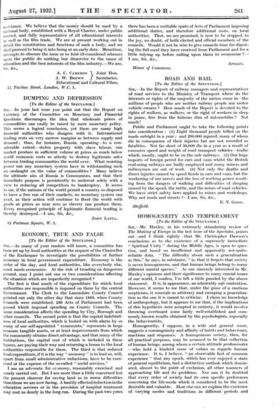ECONOMY, TRUE AND FALSE [To the Editor of the SPECTATOR.]
Sin,—As many of your readers will know, a committee has been set up by local authorities at the request of the Chancellor of the Exchequer to investigate the possibilities of further economy in local government expenditure. Economy is the order of the day, and local authorities, like everybody else, must needs economize. At the risk of treading on dangerous ground, may I point out one or two considerations affecting the situation which are imperfectly recognized ?
The first is that much of the expenditure for which local authorities are responsible is imposed on them by the central Government. The Clerk to the Lancashire County Council pointed out only the other day that since 1889, when County Councils were established, 230 Acts of Parliament had been passed which imposed spending on County Councils. The same consideration affects the spending by City, Borough and other councils. The second point is that the capital indebted- ness of local authorities, which is looked on with alarm by so many of our self-appointed " economists," represents in large measure tangible assets, or at least improvements from which the community obtains direct advantage, and that many of the institutions, the capital cost of which is included in these figures, are paying their way and returning a bonus to the local authorities responsible for them. The third is that reduced local expenditure, if it is the way " economy " is to lead us, will, apart from small administrative reductions, have to be exer- cised at the expense of the so-called " social services."
I am an advocate for economy, reasonably exercised and sanely carried out. But I am more than a little concerned lest the present clamour for saving land us in worse difficulties thanthose we are now facing. A hastily effectedrefluction inthe education services or in the provision of hospital treatment may cost us dearly in the long run. During the past two years
there has been a veritable spate of Acts of Parliament imposing additional duties, and therefore additional costs, on local authorities. That, we are promised, is now to be stopped, to the joy, no doubt, of both elected and official members of the councils. Would it not be wise to give councils time for digest- ing the full meal they have received from Parliament and for a little tidying up before calling upon them to economize ?- I am, Sir, &c.,
APSLEY.
House of Commons.


























 Previous page
Previous page